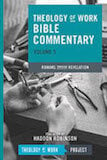Best of Daily Reflections: Full Christianity: Doing, Thinking, and Being, Part 4
Daily Reflection / Produced by The High Calling
So I tell you this, and insist on it in the Lord, that you must no longer live as the Gentiles do, in the futility of their thinking.
Ephesians 4:17
So far, in our close reading of Ephesians 4:17, we have seen that full Christianity is a matter of doing, of walking in God's ways while avoiding the ways of the world. Today, our focus turns to thinking. Ephesians 4:17 shows that the Christian life is not just a matter of how we act. It has everything to do with how we think as well. This verse assumes that our thinking influences our actions. If we think wrongly, then we will act wrongly. By implication, if we think rightly, we will act rightly.
But, once again, the emphasis in verse 17 is upon the negative character of life apart from God (4:18). Gentiles are caught "in the futility of their thinking." The KJV speaks of "the vanity of their mind," whereas contemporary translations prefer "futility" (NIV, ESV, NRSV). The Greek word behind this translation is mataoites, which means "emptiness, futility, worthlessness, vanity, purposelessness." In the Greek translation of the Old Testament, this word shows up 39 times in Ecclesiastes, beginning with the second verse, " 'Meaningless! Meaningless!' says the Teacher. 'Utterly meaningless! Everything is meaningless.' " (Eccles. 1:2, where mataoites is translated as "meaningless"). The Message captures the sense of mataoites in Ephesians 4:17 by speaking of "the empty-headed, mindless crowd."
What might be an example of futile thinking that Christians ought to reject? Consider, for example, the common notion that happiness is to be found in the accumulation of massive amounts of stuff. In our culture, we find it natural to believe that the more things we have, the happier we will be. This way of thinking is popularized in the media and reinforced by hundreds of ads that bombard our consciousness each day. But, even apart from biblical teaching, academic research shows that happiness is not correlated with more possessions after one has the basics of life. It's easy to see how the "more stuff = more happiness" way of thinking leads to behaviors that lead us far away from a life of wholeness. We exhaust ourselves trying to earn more money to buy more things, reducing time for precious activities, such as engaging with family and friends. We miss out on the joy of giving to others because we hold tightly to our possessions.
The "more stuff = more happiness" mindset is just one example of empty thinking that pervades our culture. You might want to take time to consider others kinds of futile thought that influence you. Ephesians 4:17 urges us to reject ways of thinking that lead us to empty living. Rather, by God's grace at work in our lives, we will learn to think in new ways, ways that guide us to live fully and meaningfully as God's people.
FOR REFLECTION: Where do you see "futile thinking" in our world today? How has empty "futile" thinking held you back in your work? How has the "more stuff = more happiness" mentality held you back in your work? How have you been influenced to think in this way? What helps you to think in the ways of God?
PRAYER: Gracious God, I expect I am not even aware of many of the ways I engage in futile thinking. It feels normal to think in the ways of the world. Yet, I recognize that if I'm going to experience the new life in Christ, I need to put aside such patterns of thought and to learn to think as you do. Help me, Lord, to reject empty thought and to adopt your ways of thinking. Shape my mind, my values, my assumptions by your truth. Amen.






